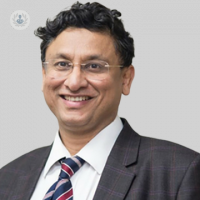Breast cancer: an expert's guide
Written by:Breast cancer is one of the most common cancers in the UK, with more than 55,000 cases a year on average. In his latest online article, renowned professor of surgery and oncology Professor Jayant Vaidya gives a comprehensive explanation of the different types of breast cancer, their symptoms and the treatment options available.

What are the first warning signs of breast cancer?
Some of the first warning signs of breast cancer include:
- A dimpling of skin - this can be very subtle and visible especially when raising your arms, bending forwards or contracting your chest muscles by pressing your hands on your hips.
- A lump in the breast is another warning sign.
- Nipple discharge could also indicate the presence of breast cancer. For example, you may find it has made a small stain on your bra.
A change in the shape of the breast is another possible warning sign. You can read more about the warning signs here.
Are the different types of breast cancer?
Breast cancer can arise from the cells that line the ducts - which normally carry milk from the glands. Cancer can also arise from these milk glands but that is less common (8 to 15% of cases).
Ductal Carcinoma in Situ (DCIS) is another type of breast lesion that has cancer cells, but when in a pure state it does not have the ability to spread and grow in other organs. .
Does breast cancer spread quickly?
No, breast cancer doesn’t usually spread quickly. By the time the cancer can be felt easily by hand, it has probably been there for several months or even a few years, especially in older women.
On average, it is estimated that breast cancer doubles in size every 3 months, but there is a wide variation - from 2 months to 2 years

How is breast cancer typically treated?
Breast cancer should be treated in a holistic manner - taking into consideration the disease and the patient as a whole.
The disease treatment in early stages can be considered in two parts - local treatment - that is for the breast and nearby tissues and systemic treatment for any cells that might have spread to other parts of the body
The local treatment consists of surgical removal (with reconstruction if necessary) and radiotherapy (which can be given during the operation or after the operation)
The systemic treatment consists of hormonal drugs, which are usually tablets, chemotherapy, biological therapy, immunotherapy and treatments that modify the tumour microenvironment.
How successful are these breast cancer treatments?
Over the last 40 years, deaths from breast cancer have been consistently falling at a great pace. Treatments are ever more successful. However, it is important to ensure a full workup, careful planning and choosing the right treatment. Of course, in some cases, the cancer can spread to the rest of the body and it is then it is not possible to cure - but with new treatments, survival even after spread (metastasis) has been greatly improving in the last decade.
Professor Jayant Vaidya is a highly-revered professor of surgery and oncology based in London. If you would like to book an appointment with Professor Vaidya, you can do so today via his Top Doctors profile.


